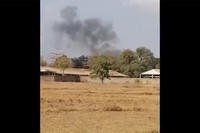ABUJA, Nigeria — U.S. Secretary of State Antony Blinken on Tuesday pitched the United States as a better security partner for Africa in place of Russia’s Wagner mercenary group, which he accused of exploiting coup-hit and conflict-hit nations in the continent's Sahel region.
Blinken, who is visiting Nigeria as part of an Africa tour to strengthen bilateral relations, said the U.S. will continue to support Nigeria and other regional partners in their efforts to help stabilize the Sahel, the vast region south of the Sahara Desert that Islamic extremist groups have turned into a global terror hot spot as it struggles with a recent spate of coups.
“We hope it can make a difference in restoring the constitutional order and restoring a critical partner in trying to find security in the region,” Blinken told reporters in the Nigerian capital, Abuja, speaking in particular about Niger, where a coup has threatened years of support by Western and European nations.
Until Niger’s elected President Mohamed Bazoum was deposed by his elite soldiers in July, the country had played a critical role in U.S. counterterrorism activity in the Sahel and was seen as one of the last democratic nations in the region to partner with to counter jihadi violence linked to al-Qaida and the Islamic State group.
But as Niger faced sanctions from neighbors, the West and Europe, its new junta severed military ties with European nations and turned to Russia for security partnership. Neighboring Burkina Faso and Mali, which have also had two coups each since 2020, have also taken similar steps.
Wagner, which is active in parts of Africa including Mali, was also one of the first sources of help that Niger's military leaders reached out to for support after the coup.
In those African countries where Wagner is offering security support, “what we’ve seen is actually a problem (of insecurity) getting manifestly worse and worse,” Blinken said.
“You see the exploitation of people and resources by Wagner … Having said that, it’s important that we’ve been working to support our partners who are trying to find effective ways of fighting insecurity,” he added.
Blinken said that one key aspect of U.S. support to Nigeria and the rest of the Sahel is to strengthen the capacity of their security forces in terms of equipment and technology, intelligence sharing, and technical support.
“It goes to having a comprehensive approach that genuinely focuses on citizens’ security, working with local communities in partnership, demonstrating the security forces that are there, first and foremost, to protect them and to support their needs,” he added.
At a time when observers say issues concerning Africa seem to have been pushed to the back burner under President Joe Biden’s administration, such a trip by Blinken presents an opportunity to “move partnerships forward in strengthening democratic institutions” in the continent, according to Oge Onubogu, director of the Africa Program at the U.S.-based Wilson Center think tank.
Beyond supporting regional efforts to reverse the recent coups, Onubogu said America must also help in addressing the root causes of the military takeovers seen by some citizens as “an opportunity to transition to something better.”
“This trip presents an opportunity for the U.S. to have real constructive discussions with civil society actors, think tanks in the region and some government actors about what how to adapt to systems that we currently have to transition to something that is in the best interest of African citizens,” she said.












